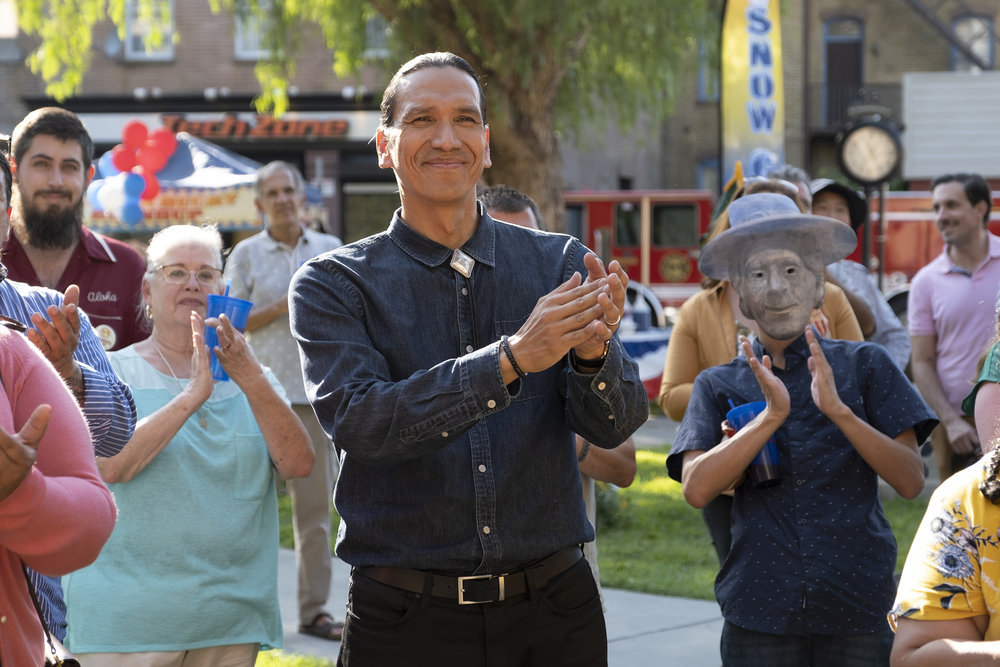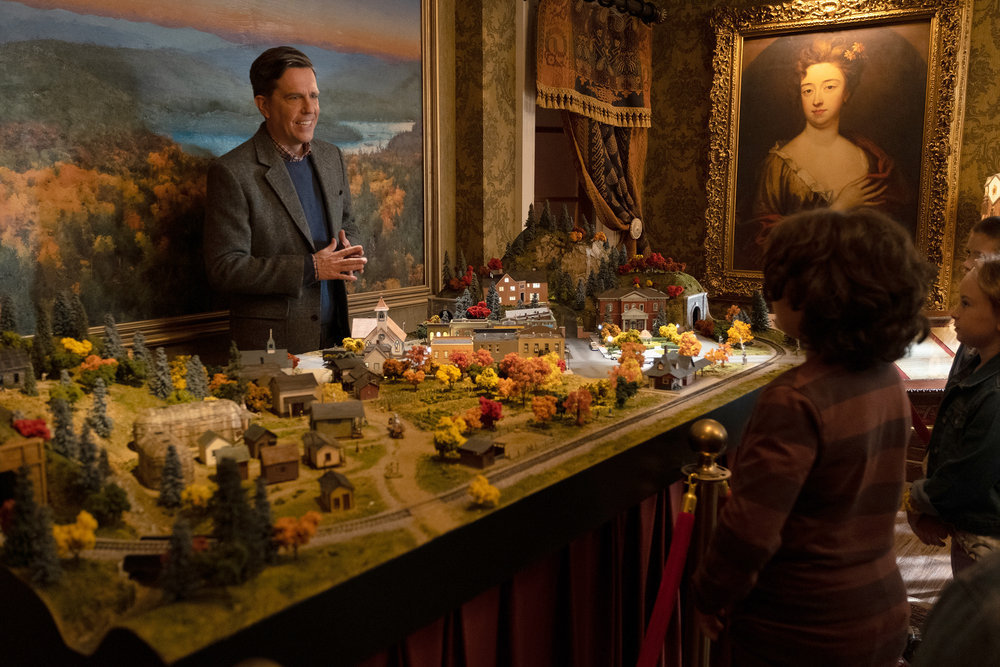It begins, like so many conflicts these days, with a monument to a dead white guy. At issue isn’t the legacy of its subject, Lawrence “Big Larry” Rutherford, the founder of the fictional Upstate New York town that gives Peacock’s Rutherford Falls its title, so much as the fact that his bronze likeness sits smack in the middle of a main thoroughfare, where out-of-towners keep crashing their cars into it. Clearly, the thing needs to move. But in 2021, a decision like this can never be simple. When Nathan Rutherford (Ed Helms), the self-appointed steward of the family’s legacy, gets wind of the plan, he makes a beeline to the mayor’s (Dana L. Wilson) office to throw a tantrum. The dust-up serves as an introduction to the symbiotic, historically fraught relationship between the white residents of Rutherford Falls and their Native American neighbors in the (also fictional) Minishonka Nation.
This is all surprisingly topical for a sitcom pilot from Michael Schur, the Parks and Recreation, Brooklyn Nine-Nine and The Good Place mastermind who created Rutherford Falls alongside Helms and showrunner Sierra Teller Ornelas (Superstore). While they’re timely in their own, mostly subtextual ways, Schur’s beloved comedies have rarely ripped from the headlines. And while he consistently hires diverse casts, the characters they play rarely seem too concerned with identity politics. All of which makes this show, despite the gentle tone it shares with his other work, a considerable departure from Schur’s comfort zone. The equally promising and frustrating result, which debuts on Peacock April 22, bears evidence of some significant growing pains, combining ambitious, intriguing ideas and slow, overly delicate storytelling.
At the center of a story that, in the four episodes sent to critics, keeps expanding outward into the larger community are Nathan and his best friend Reagan Wells (comedian and Woman of Size podcaster Jana Schmieding, instantly likable in a breakthrough role). In some ways, they’re an odd couple. The scion of an old, prosperous, white family, he operates a small museum dedicated to the town’s 400-year history—a job that entails asking schoolchildren whether they have to go potty before he starts the tour at least as much as it involves historical preservation. She grew up on the Minishonka reservation and went on to earn multiple master’s degrees, only to wind up overseeing a dinky cultural center in a windowless corner of the Minishonka casino, where she sometimes has to wrestle precious Indigenous artifacts out of the hands of sloshed gamblers.
But the friendship works, because Reagan and Nathan are also both history nerds, and two people stuck in personal and professional holding patterns, in a world that is hurtling forward at a relentless pace. Reagan needs to learn to assert herself, go after the things she wants in life and find her place within a Minishonka community that has, for reasons that slowly become apparent, come to see her as an outsider. Patronized and bullied by the image-conscious corporate wing of his family, in New York City, Nathan is pretty sweet for someone so spoiled, but his willful ignorance of the Rutherford clan’s flaws, past and present, threatens to turn him into a reactionary. When his Founder’s Day speech devolves into a childish meltdown, local news reports attract the attention of hunky NPR reporter Josh Carter (Schitt’s Creek star Dustin Milligan), who’s eager to frame Rutherford Falls as a “powder keg” of quintessentially American tensions.

Rounding out the main cast are their respective coworkers. Nathan has a detail-oriented, gender-nonconforming teenage assistant, Bobbie Yang (Jessie Leigh of Paramount’s Heathers), a character that feels a bit underwritten in early episodes. Much more compelling is Terry Thomas (the always-fantastic Michael Greyeyes, recently seen in I Know This Much Is True and True Detective), Reagan’s boss and the casino’s CEO. In a town populated by guileless, soft-hearted idealists, Terry is refreshingly complex—ruthless in advancing his own material interests but also sincerely committed to righting the historical wrongs perpetrated against his people.
It’s a setup rich with dramatic as well as thematic potential. For all that they poke fun at Josh’s cub-reporter opportunism, Schur, Helms and Ornelas—a Navajo showrunner leading a rare staff of Indigenous writers, Schmieding among them—also clearly see Rutherford Falls as an allegorical powder keg. Just as the afterlife played host to Schur’s adventures in moral philosophy in The Good Place, the similarly serialized sitcom Rutherford Falls seems to be laying groundwork for an exploration of a foundational American sin that predates even slavery.
No wonder that setup is taking so long. With only five characters in its main ensemble, the show still appears to be in the early stages of its world-building by the end of the first four episodes. This isn’t necessarily a problem; The Good Place famously spent its whole first season building up to a premise that wasn’t fully revealed until the finale. Thanks to a bizarre setting that lent itself to surreal comedy and especially to an almost freakishly charismatic cast with all-time great chemistry, viewers never lost patience with the larger story. But an essentially realistic, contemporary small town doesn’t have the same elasticity as an imagined afterlife, and while Helms is a talented comic actor who’s well cast in his lead role, the list of sitcom stars who are as inherently enjoyable to watch as Ted Danson is extremely short.

I’m not totally sold on Helms’ character, either. While Reagan, Jason and Terry are plausible human beings, Nathan comes across as a sort of thought experiment—a vehicle for the inevitable argument that unity through enlightenment is possible, even in an era when disagreements over what to do with a statue of a guy who’s been dead for centuries can bring a whole community to its knees. A smart, kind, thoughtful historian whose understanding of the atrocities committed against Native Americans by white settlers is stuck somewhere in the mid-20th century just doesn’t seem like a person who could actually exist in this day and age. The show is careful to contrast him, in its relatively weak second episode, with his old mentor (guest star Paul F. Tompkins), an academic who uses his podcast to bloviate against “the P.C. police” and praise the Rutherfords for giving the county its “first white baby.” Nathan is aghast. But could it really have taken so long for him to discover that, in promoting his heritage, he’s aligned himself with white supremacists? Has such a naive man ever walked the earth?
The show is at its best when it stops apologizing for Nathan’s ignorance and starts spending more time with other characters, as it does in a third episode that introduces Josh’s story line and a fourth that focuses on Terry’s childhood awakening to what he calls “tribal capitalism” (as opposed to the more noxious “American capitalism”). When you consider that even Schur’s less high-concept projects, like Parks and Rec, tend to hit their stride in the second or third season, there’s ample reason to believe that Rutherford Falls will only keep improving. On the other hand, there’s also a distinct possibility that the show plods along so gingerly and hits so many bumps early on because it’s actually impossible to make a lighthearted comedy series about nice people reckoning with a centuries-old legacy of colonialism, poverty and genocide.
That’s not to say I’ll be giving up on it anytime soon. Not only does Schur’s track record merit sticking around, but the show has so much ambition, and Hollywood’s abysmal record on Indigenous representation can only be repaired by Native creators telling their own stories. Here’s hoping that viewers already overwhelmed by streaming options will have the same patience.
More Must-Reads from TIME
- Caitlin Clark Is TIME's 2024 Athlete of the Year
- Where Trump 2.0 Will Differ From 1.0
- Is Intermittent Fasting Good or Bad for You?
- The 100 Must-Read Books of 2024
- Column: If Optimism Feels Ridiculous Now, Try Hope
- The Future of Climate Action Is Trade Policy
- FX’s Say Nothing Is the Must-Watch Political Thriller of 2024
- Merle Bombardieri Is Helping People Make the Baby Decision
Contact us at letters@time.com